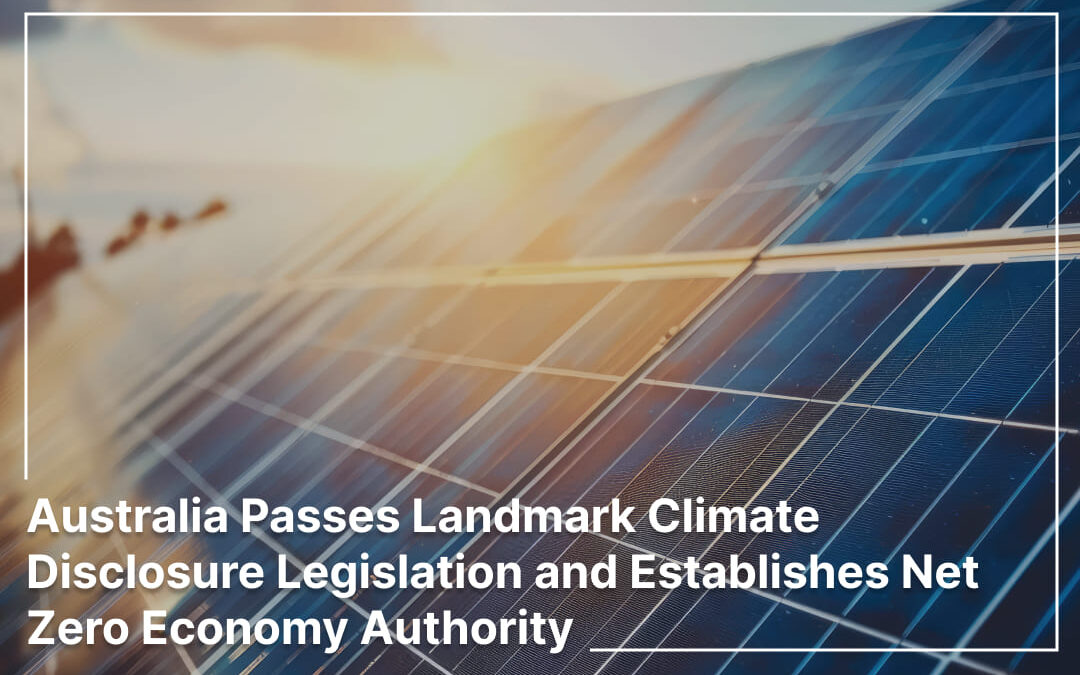In a major step towards advancing climate action, Australia’s House of Representatives has passed the Treasury Laws Amendment bill, introducing mandatory climate-related reporting requirements for large and medium-sized companies. This legislation, which has now cleared both houses of Parliament following approval by the Senate in August, marks a significant move in requiring businesses to disclose climate-related risks,
opportunities, and emissions across their value chains, with reporting beginning in 2025 for the largest companies.
The new regulations are part of Australia’s broader effort to align with global climate disclosure standards, following the lead of the International Sustainability Standards Board (ISSB). Australia’s Accounting Standards Board (AASB) is in the process of drafting specific standards, while the Australian Auditing and Assurance Board (AUASB) is working on assurance guidelines for climate disclosures, expected to be released later in 2024.
What Companies Can Expect from the New Legislation
Starting in January 2025, Australia’s largest public and private companies will need to provide detailed climate-related disclosures. This will apply to companies meeting specific thresholds, including having more than 500 employees, generating over $500 million in revenue, or holding more than $1 billion in assets. Asset owners with over $5 billion in assets will also be included. Medium-sized companies, those with 250+
employees and $200 million+ in revenue, will follow in July 2026, and smaller companies will join in July 2027.
Importantly, the legislation allows for a phased approach, particularly in Scope 3 emissions reporting. Companies will be granted an additional year to gather and report indirect emissions data from their value chains and will receive a three-year window of legal protection concerning these disclosures.
Welcomed by Investors
Investor groups have applauded the new law, with the Australian Council of Superannuation Investors (ACSI) noting that the mandatory disclosures will provide much-needed transparency. With clearer insights into companies’ exposure to physical and transitional climate risks, investors can integrate this information into their decision-making and risk management processes, promoting responsible stewardship.
A Broader Vision: The Net Zero Economy Authority
In tandem with the climate disclosure legislation, Parliament also voted to establish the Net Zero Economy Authority, a body tasked with guiding Australia’s economic transformation towards a net zero future. The Authority will play a crucial role in reskilling workers, particularly in high-emission industries, as well as facilitating engagement with industry and investors to seize new opportunities in clean energy.
This move builds on the Australian government’s ambitious climate targets, including a 43% reduction in emissions by 2030 (from 2005 levels) and achieving net zero by 2050. The Authority will support workers in transitioning to the green economy and help regions and communities attract investment in clean energy industries, ensuring a just transition for all Australians.
MP Patrick Gorman, Assistant Minister to the Prime Minister, highlighted the importance of this legislation, emphasizing that it will not only help the nation reach its climate goals but also provide tangible benefits for workers and regions by fostering new opportunities
in the evolving clean energy sector.
Conclusion:
Australia’s climate-related disclosure requirements and the establishment of the Net Zero Economy Authority are powerful steps towards fostering accountability and driving sustainable growth. As the global push for ESG (Environmental, Social, and Governance) integration intensifies, companies operating in Australia will be expected to adapt quickly, ensuring compliance while positioning themselves as leaders in climate responsibility.
At AccelESG, we are committed to helping businesses navigate this new regulatory landscape. Our advanced ESG reporting platform is designed to simplify compliance, enhance transparency, and empower companies to take charge of their sustainability journey. Whether your organization needs help tracking emissions across the value chain, preparing for Scope 3 reporting, or aligning with global ESG standards, AccelESG is here to support your transition to a more sustainable future.
Stay tuned for more insights as Australia embarks on this critical journey towards a net zero economy.

